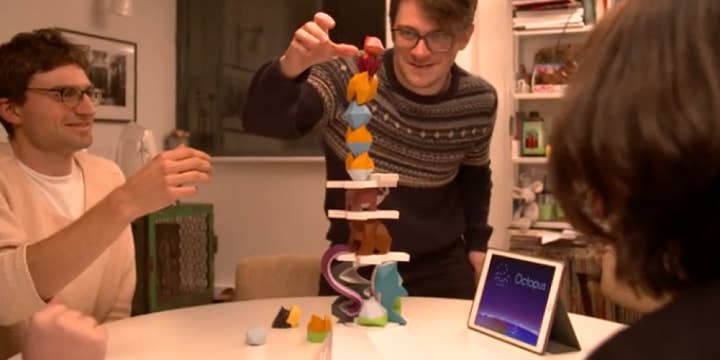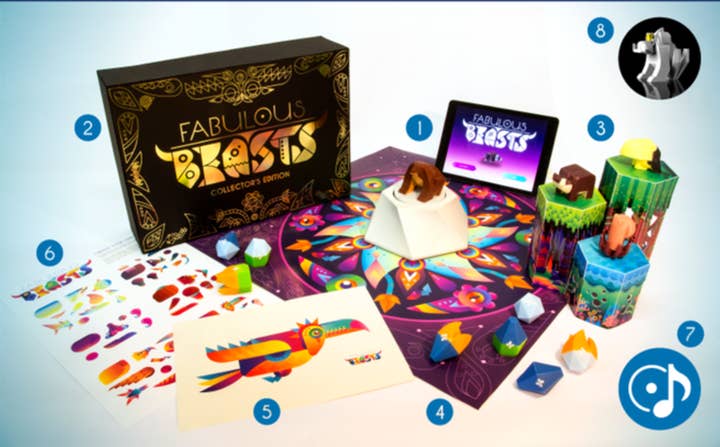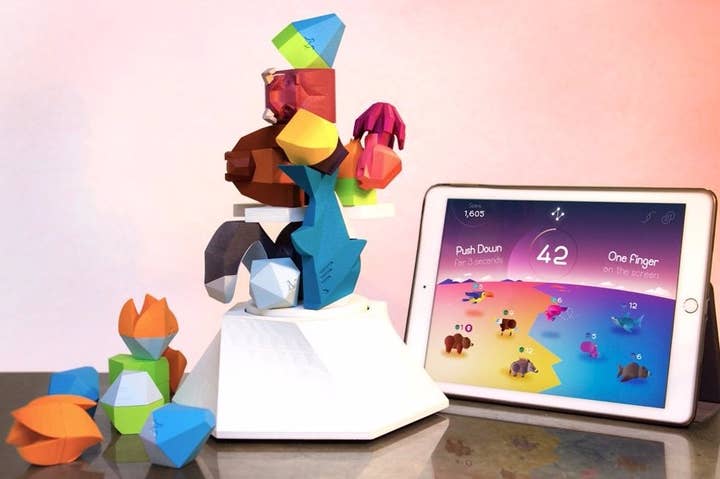Mindful parents, Minecraft kids & squiffy millennials
Sensible Object's Alex Fleetwood talks Fabulous Beasts
Squirrelled away in the depths of London's Somerset House, on one side of a bustling alleyway at the bottom of several small staircases, is the hive of activity which houses Sensible Object, the small digital/physical startup behind the Kickstarter success of Fabulous Beasts. Every bit a magical workshop, the studio straddles the divide between physical and digital worlds with colourful anarchy, piles of bright plastic prototypes heaped on every surface. The man I'm here to see, Alex Fleetwood, bustles around with obvious, anarchic intelligence - ink stains and many-hued plastic shavings painting him as a sort of toymaker/alchemist hybrid who you'd imagine to be happiest buried under a pile of parts and blueprints. I half expect part-finished automatons to spill from his sleeves as he explains his project with a measured intensity.
"I've been making games that combine digital and physical for a while now, getting on for ten years," Fleetwood explains when I ask him why he was so inspired to make a digi-physical game which is part Jenga, part Black & White, part Buckaroo, entering a toys-to-life market dominated by some of the biggest IP to have ever existed. "It's a real passion of mine, driven as much by my experience as a parent and as a game maker as it is by any commercial imperative. But I do think that there's a really exciting commercial case to be made for small startups tackling the toys-to-life space.
"There are a lot of really strong emotional drivers for the sector, which makes us believe that it's really going to grow and there'll be lots of room for new entrants as a result"
"I think that, whilst right now it's the bigger companies which have the lion's share of the market, there are some very disruptive tools and technologies which are fairly well established, things like Arduino and 3D printing, which mean it's a lot more possible for small companies to engage successfully with the Chinese manufacturing ecosystem. We're seeing that with the rise of hardware startups in other sectors, with incubators like Highway One turning out cohorts of really exciting companies.
"So I think what we're really doing is combining the route to market strategy of a hardware startup with the insight and experience of a games company. I think the reason that the toys-to-life sector is so huge is that there's sentiment behind it; for Millennials who really enjoy tabletop gaming nights and social experiences, collectors and, especially, parents who are looking for digital experiences which give the benefits of both video games and real world social play. There are a lot of really strong emotional drivers for the sector, which makes us believe that it's really going to grow and there'll be lots of room for new entrants as a result."
Fabulous Beasts is a simple enough proposition. Consisting of a basestation, several geometrically stylised playing pieces and a companion app, NFC tech pairs a physical balancing game with a lightweight strategy management element. Adding creatures to the pile on the basestation will populate the virtual world, with mutators creating hybrids like sharkeagles and batbears, more fabulous than their composite animals. Elemental counters improve the lot of their respective environments, making the creatures that dwell in them happier and offsetting the jealousy they may feel towards their more exotic contemporaries. Timers and specific orders make the tower-building more and more frantic as the populations diversify.

It's a product of a perfect storm of elements: crowdfunding, 3D printing, and app store economies. It's breaking new ground in a new market, and Fleetwood expects it to be the vanguard of a fresh wave of innovation tied to the marriage of manufacturing and software.
"There's a great history of this stuff, following on from lots of different great design ideas," he says. "I think the exciting thing now is...there's a phrase used in Silicon Valley which is 'the peace dividend of the smartphone war'. Which is that there's this huge supply chain of sensors, display tech, reduced costs for chips. What that gives us as designers is a huge range of resources to work with. Just by adding in that one extra sensor to our platform, we've achieved a totally new type of gameplay.
"I think that's one of the reasons I'm quite bullish about the ability of smaller companies to compete with the larger incumbents. If you look at the way something like the mobile games market evolved, a lot of the innovation was driven by the smaller companies. Many of them grew and scaled as a result of those innovations. I think we might see a similar sort of evolution in the physical/digital market over the next five to seven years."
"If you look at the way something like the mobile games market evolved, a lot of the innovation was driven by the smaller companies"
One of the aspects which gives board games their longevity and timeless appeal is the fact that, as long you're not one of those awful people who bends cards, loses pieces under the sofa and otherwise damages games, everything you'll need is in the box. Even adding batteries is a barrier to that accessibility, so I ask Fleetwood what his plans are for legacy support; what will happen when players open the box in three years time and realise they no longer have the iPad to go with it?
"I think it's a pretty solid bet that both Android and Apple will be around for the foreseeable [future]," he points out, reasonably. "We've got a digital development pipeline which makes porting to other devices easy, we're building in Unity, [and] I think we have a relatively straightforward digital product. We see the skill in this sort of hybrid digital/physical project as engineering the relationship between the two. Both of those elements have to be polished, but actually we're still developing what makes a great experience. But on the digital side it's about UI, fairly straightforward elements; it's not about a rich, super complex 3D environment.
"So from the perspective of the cost of updating and maintaining that software, it's pretty trivial compared to an MMO or something like that. It's certainly a question that we've had from backers. People really value the fact that everything you need to play a board game is in the box and you just need to get that out to make it happen. Our response to that is that, as long as we're a going concern, we'll make sure that the game is available on as many platforms as possible. If we're not here then we'll open source the underlying software and if there's a fanbase out there which wants to maintain it, then they'll be welcome to. I think at this point in the life cycle of the company, that's the best thing."

Fabulous Beasts isn't an impulse purchase. With an RRP of £69, the game isn't perhaps something most would pick up on a whim, but it falls well within the boundaries of premium board games. Fleetwood sees his target demographic as diverse and engaged - everyone from post-pub students to young parents looking for meaningful ways to interact with their children, a range Fleetwood summarises as "squiffy millennials, mindful parents and Minecraft kids." There's also a 'whale' market on the horizon.
"The other pillar we want to develop is that of collectors and more affluent people who want special edition sets made of more luxurious materials, one-offs, that sort of thing," he says. "If you look at a business model of something like the Apple Watch, for example, it scales really well to some very nice finishes etc. We really want to make games which can hold their own in a design-conscious consumer's living room. Board games have their own aesthetic and they're often very desirable objects in and of themselves, but they haven't really been thought of as display objects. That's something we're really reaching for.
"I think part of being a startup is planning to try a lot of different things"
"We've also got some more speculative ideas about things, like sending us a photo of your favourite stack so we can 3D print it for you to display. I think part of being a startup is planning to try a lot of different things. Even in our Kickstarter we've tried about a dozen different SKUs to see what resonates with our backers. Taking an enterprising, data-driven approach to design and production is key. We've learned a lot."
Part of the plans for diversification include, inevitably, the potential adoption of other IP, a route which has been immensely beneficial to pioneers like Disney Infinity. Fabulous Beasts doesn't quite have Marvel or Pixar in its sights just yet, but there are brands which Fleetwood feels would lend themselves to the game well.
"Licensing is a competitive environment, where you have some very strong players," he admits. "We want to make sure we're ready for that in every sense. The question for us is around finding our niche in the branded space, thinking about what the right licence is for us. Are there UK based global character IP brands that make sense for us? Is it about looking at a fairly niche indie brand like Adventure Time? How do we form those relationships in a way that makes sense for us at the scale we are presently?
"I think the other way of framing it is to build out the story world and the narrative from the game we've already created to extend that into other media. The background we have, of this slightly twisted family of gods creating hybrids and ending the world by accident, I think that would work for a webcomic or a series of short animations."

